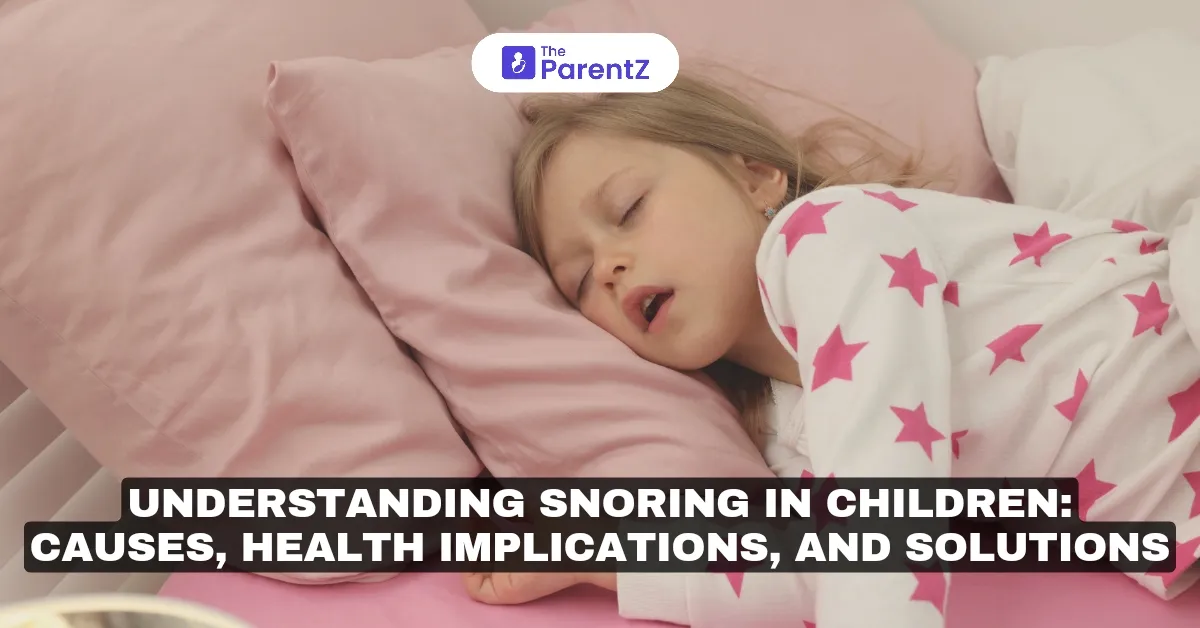Snoring is often dismissed as a harmless quirk, but when it comes to children, it can indicate underlying health concerns. According to studies, nearly 7–12% of children snore regularly, with about 2–4% experiencing obstructive sleep apnea (OSA). While occasional snoring may result from temporary congestion, habitual snoring can lead to significant health issues if left unaddressed.
Understanding the causes and potential implications of snoring in children is crucial for parents and caregivers to take timely action.
What Causes Snoring in Children?
Snoring occurs when airflow through the throat and nose is partially blocked, causing the tissues in the airway to vibrate. Several factors can contribute to this condition in children:
1. Enlarged Tonsils or Adenoids
• The most common cause of snoring in children, enlarged tonsils or adenoids can obstruct the airway, particularly during sleep.
2. Allergies or Nasal Congestion
• Seasonal allergies, colds, or chronic sinus infections can lead to swollen nasal passages, making it harder for children to breathe freely.
3. Obesity
• Excess weight around the neck can compress the airway, increasing the likelihood of snoring.
4. Structural Abnormalities
• Deviated septum, small jaw, or other anatomical issues can contribute to snoring by restricting airflow.
5. Sleep Position
• Sleeping on the back may cause the tongue and soft tissues to collapse toward the throat, partially blocking the airway.
6. Neuromuscular Conditions
• Conditions that weaken the throat muscles can lead to airway obstruction during sleep.
7. Secondhand Smoke Exposure
• Environmental factors, such as exposure to cigarette smoke, can irritate the respiratory system and increase snoring risk.
8. Obstructive Sleep Apnea (OSA)
• Habitual snoring may indicate OSA, a serious condition where the airway becomes completely blocked multiple times during sleep.
Health Implications of Snoring in Children
While occasional snoring may be harmless, habitual snoring can have far-reaching effects on a child’s physical and emotional health.
1. Interrupted Sleep Patterns
• Snoring often leads to fragmented sleep, preventing children from entering restorative deep sleep phases. This can result in fatigue, irritability, and difficulty concentrating during the day.
2. Behavioral and Cognitive Issues
• Poor sleep quality can impair brain function, leading to problems such as ADHD-like symptoms, learning difficulties, and memory issues.
3. Stunted Growth
• Deep sleep is when the body produces growth hormones. Chronic sleep disturbances caused by snoring may affect a child’s growth and development.
4. Cardiovascular Risks
• Untreated OSA, a common cause of snoring, can strain the heart over time, increasing the risk of hypertension and other cardiovascular conditions.
5. Weakened Immune System
• Lack of adequate sleep can compromise the immune system, making children more susceptible to illnesses.
6. Emotional and Social Challenges
• Sleep deprivation due to snoring can affect a child’s mood, leading to anxiety, depression, or difficulties in social interactions.
Diagnosing the Underlying Cause of Snoring
If snoring persists for more than three nights a week or is accompanied by symptoms like gasping, pauses in breathing, or excessive daytime sleepiness, parents should consult a pediatrician.
A comprehensive evaluation may involve:
• Physical Examination: To check for enlarged tonsils, adenoids, or nasal blockages.
• Sleep Study (Polysomnography): The gold standard for diagnosing OSA and determining the severity of snoring.
• Allergy Testing: To rule out triggers causing nasal congestion.
• Imaging Tests: Such as X-rays or MRIs, to assess airway structure.
Managing and Treating Snoring in Children
The treatment for snoring depends on its underlying cause. Common interventions include:
1. Lifestyle Modifications
• Encouraging weight loss in overweight children through a balanced diet and physical activity can significantly reduce snoring.
2. Addressing Allergies or Nasal Congestion
• Nasal sprays, antihistamines, or humidifiers can help relieve congestion caused by allergies or colds.
3. Tonsillectomy or Adenoidectomy
• For children with enlarged tonsils or adenoids, surgical removal is often the most effective solution for resolving snoring and OSA.
4. Continuous Positive Airway Pressure (CPAP)
• In severe cases of OSA, CPAP therapy ensures the airway remains open by delivering a constant stream of air during sleep.
5. Oral Appliances
• Dental devices designed to reposition the jaw and tongue can improve airflow in children with structural abnormalities.
6. Environmental Changes
• Reducing exposure to smoke, allergens, and pollutants can alleviate snoring caused by respiratory irritation.
How Parents Can Monitor and Support Their Children
Parents play a critical role in identifying and managing snoring. Here are some tips:
1. Keep a Sleep Diary: Track your child’s sleep patterns, snoring frequency, and any associated symptoms like gasping or restlessness.
2. Promote Healthy Sleep Hygiene: Establish consistent bedtime routines, limit screen time before bed, and create a comfortable sleep environment.
3. Encourage Side Sleeping: Sleeping on the side can reduce the likelihood of airway collapse.
4. Be Observant: Watch for behavioral changes like irritability, difficulty focusing, or signs of daytime fatigue.
5. Seek Professional Help: If snoring persists, consult a pediatrician or sleep specialist for a thorough evaluation.
When to Worry About Snoring
Occasional snoring due to temporary factors like a cold is generally not a cause for concern. However, parents should seek medical advice if:
• Snoring is habitual (occurs more than 3 nights per week).
• There are pauses in breathing or gasping sounds during sleep.
• The child exhibits excessive daytime sleepiness or behavioral issues.
• Growth or academic performance appears to be affected.
Conclusion: Prioritizing Children’s Sleep Health
Snoring in children is not just a noisy inconvenience—it can be a symptom of underlying health issues that demand attention. By understanding the causes, health implications, and treatment options, parents can ensure their child gets the restful sleep they need for healthy growth and development.
Taking early action to address snoring can prevent long-term complications and pave the way for better physical, emotional, and cognitive well-being. If your child snores regularly, don’t hesitate to seek professional guidance and support.





Be the first one to comment on this story.